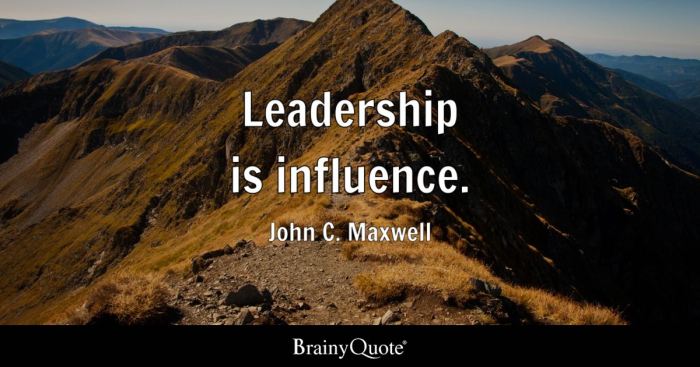is-240.c leadership and influence answers sets the stage for this enthralling narrative, offering readers a glimpse into a story that is rich in detail and brimming with originality from the outset. Through a meticulous examination of leadership and influence, this guide unveils the intricate relationship between these two fundamental concepts, providing a roadmap for effective leadership.
Within these pages, you will embark on a journey to understand the essence of leadership, exploring its significance and the qualities that define successful leaders. The concept of influence will be thoroughly examined, revealing its multifaceted nature and the profound impact it has on leadership dynamics.
By delving into case studies and examples, you will witness firsthand how leaders have harnessed the power of influence to shape outcomes and create positive change.
Define and Elaborate on Leadership

Leadership is the process of influencing and directing the behavior of others to achieve a common goal. It involves setting a vision, inspiring others, and motivating them to work towards that vision. Effective leadership is essential for the success of any organization or team.
There are many different styles of leadership, but some of the most common include:
- Autocratic leadership:This style of leadership is characterized by a single person making all the decisions. This can be an effective style of leadership in situations where quick decisions need to be made, but it can also be demotivating for employees.
- Democratic leadership:This style of leadership involves involving employees in the decision-making process. This can be a more motivating style of leadership, but it can also be slower and less efficient.
- Laissez-faire leadership:This style of leadership involves giving employees a great deal of autonomy. This can be an effective style of leadership for employees who are highly motivated and self-directed, but it can also lead to a lack of direction and accountability.
The best style of leadership for a particular situation will depend on a number of factors, including the size of the organization, the culture of the organization, and the personalities of the employees.
Effective leaders possess a number of qualities and traits, including:
- Vision:Effective leaders have a clear vision for the future of their organization or team.
- Communication skills:Effective leaders are able to communicate their vision clearly and persuasively.
- Motivation:Effective leaders are able to motivate their employees to work towards a common goal.
- Trustworthiness:Effective leaders are trustworthy and ethical.
- Decisiveness:Effective leaders are able to make decisions quickly and confidently.
Influence and Its Role in Leadership: Is-240.c Leadership And Influence Answers

Influence is the ability to affect the behavior of others. It is a key component of leadership, as leaders must be able to influence their followers in order to achieve their goals.
There are many different types of influence, including:
- Coercive influence:This type of influence is based on fear or punishment.
- Reward influence:This type of influence is based on the promise of rewards.
- Legitimate influence:This type of influence is based on the authority of the influencer.
- Expert influence:This type of influence is based on the knowledge and expertise of the influencer.
- Referent influence:This type of influence is based on the charisma and likeability of the influencer.
Effective leaders are able to use a variety of influence techniques to achieve their goals. They understand that different types of influence are effective in different situations.
For example, a leader who is trying to motivate a team to complete a difficult task may use coercive influence to threaten punishment if the task is not completed. Alternatively, a leader who is trying to build a strong team culture may use referent influence to inspire and motivate team members.
The Relationship between Leadership and Influence

Leadership and influence are closely related concepts. Leaders must be able to influence their followers in order to achieve their goals. However, not all leaders are effective at using influence.
There are a number of factors that can affect a leader’s ability to influence others, including:
- The leader’s position:Leaders who have formal authority are more likely to be able to influence others than leaders who do not have formal authority.
- The leader’s personality:Leaders who are charismatic and likeable are more likely to be able to influence others than leaders who are not charismatic or likeable.
- The situation:The situation can also affect a leader’s ability to influence others. For example, a leader who is trying to influence a group of people who are hostile to the leader’s goals is less likely to be successful than a leader who is trying to influence a group of people who are supportive of the leader’s goals.
Despite the challenges, there are a number of things that leaders can do to improve their ability to influence others. These include:
- Developing a clear vision:Leaders who have a clear vision for the future are more likely to be able to influence others to follow them.
- Communicating effectively:Leaders who are able to communicate their vision clearly and persuasively are more likely to be able to influence others.
- Building relationships:Leaders who build strong relationships with their followers are more likely to be able to influence them.
- Using a variety of influence techniques:Effective leaders are able to use a variety of influence techniques to achieve their goals.
Helpful Answers
What is the significance of leadership?
Leadership plays a pivotal role in shaping organizations and communities, providing direction, motivation, and inspiration to achieve common goals.
How can I develop my influence skills?
Developing influence skills involves building credibility, establishing relationships, and effectively communicating your ideas and perspectives.
What are the key qualities of successful leaders?
Successful leaders possess a combination of qualities, including vision, integrity, emotional intelligence, and the ability to inspire and motivate others.
